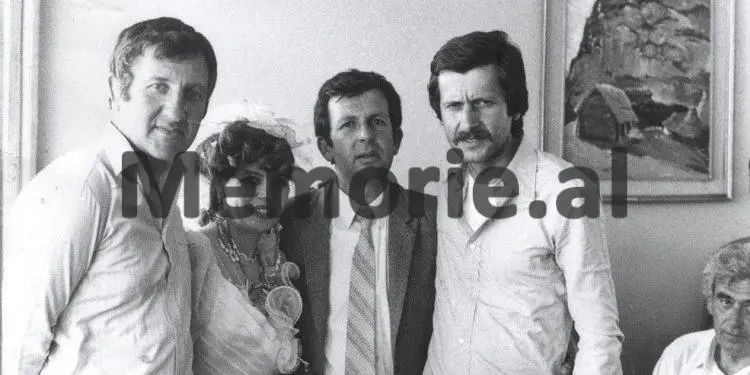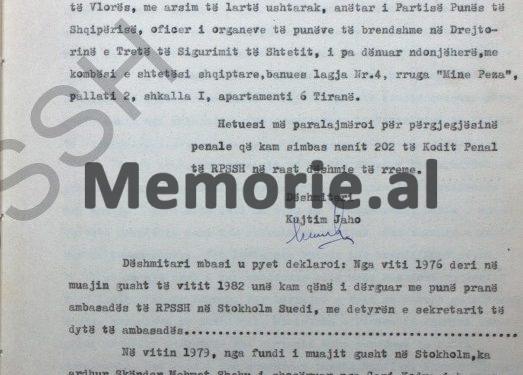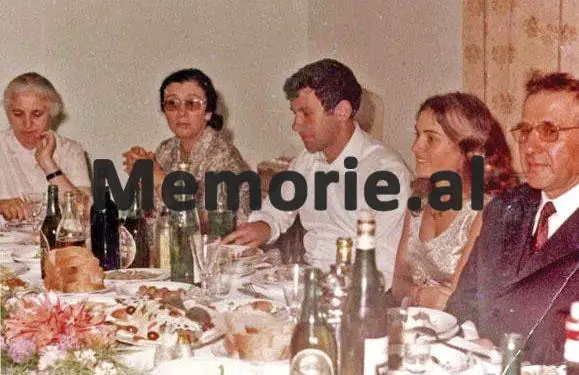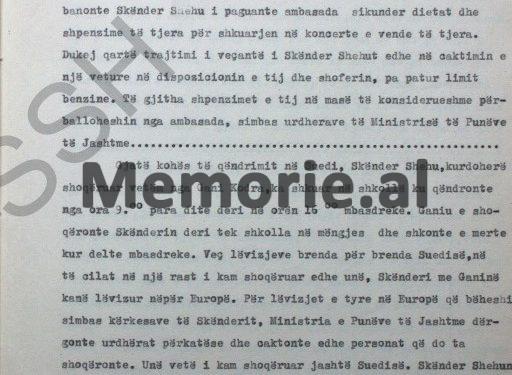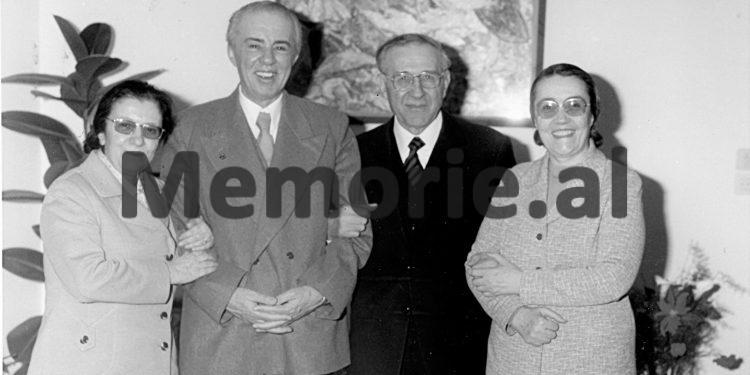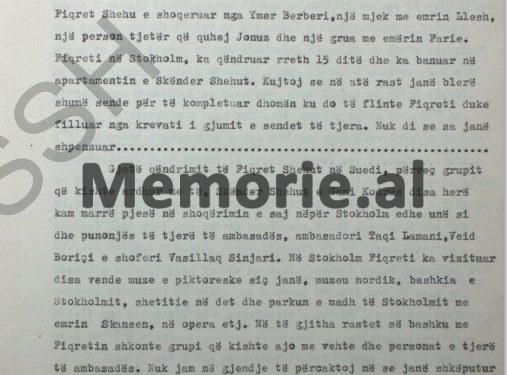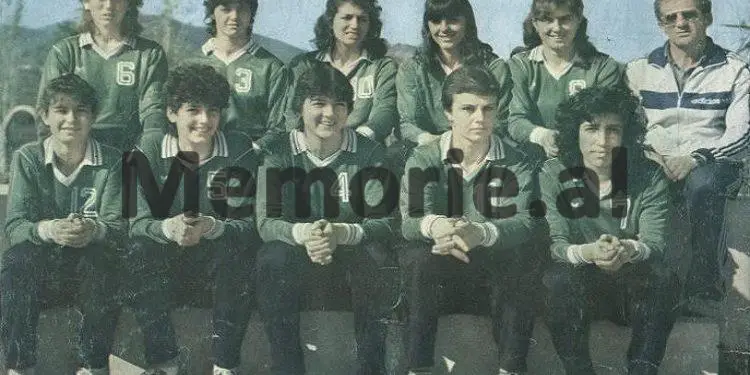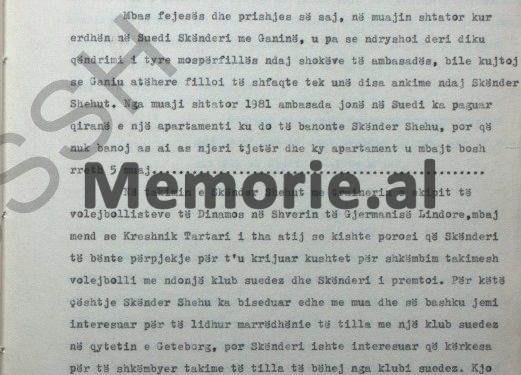From Dashnor Kaloçi
Part thirty-five
Memorie.al / Exactly 43 years ago, on the morning of December 18, 1981, the Albanian Prime Minister Mehmet Shehu, who held that position since 1953, was found dead in his bedroom (according to the official version, from a bullet “a” from a pistol) in the villa where he lived with his family, at the entrance of the “Block” of the high leadership of the PPSH (Party of Labor of Albania), just a few meters from the building of the Central Committee of the PPSH and also from Enver Hoxha’s villa 31. Although more than four decades have passed since that day, considered one of the most serious and sensational events of that regime, there is still no clear and accurate version regarding what happened to the former Albanian Prime Minister, Mehmet Shehu, on the night before December 18, 1981! However, even though after the 1990s, dozens of testimonies and archival documents related to that event have been made public, “the murder or suicide of Mehmet Shehu” remains a subject of much debate and discussion, further shrouding the truth around it in mystery!
Based on this fact, within the framework of publishing dozens of testimonies and dossiers with archival documents from the secret fund of the former State Security and the Ministry of Interior, as well as the Central Committee of the PPSH, which we have published over the three decades after the collapse of Enver Hoxha’s communist regime and his successor, Ramiz Alia, the newspaper has secured the voluminous dossier “of the enemy and the poly-agent Mehmet Shehu,” which has been taken from the secret fund of the former State Security at the Ministry of Interior (now declassified and part of the fund of the Authority for Information on the Documents of the former State Security), where with a few minor exceptions, most of them had never seen the light of publication and are published for the first time in full and with the corresponding facsimiles.
In the mentioned dossier, besides the testimonies in the investigation of witnesses or defendants, there are also complete act-expert reports from the operational-investigation group that was established immediately on the morning of December 18, 1981, led by Koço Josifi (the head of the Investigation Directorate of the Ministry of Interior of Tirana), forensic doctors Dr. Fatos Hartito and Docent Bashkim Çuberi, the prime minister’s doctors, Milto Kostaqi and Llesh Rroku, the forensic expert of the Central Criminalistics Laboratory of the Ministry of Interior, Estref Myftari, assisted by high-ranking officials of that ministry, Deputy Minister Xhule Çiraku, the head of the Investigation Directorate in the Ministry of Interior, Elham Gjika, and the deputy director of the Directorate of Interior Affairs of Tirana, Lahedin Bardhi.
This dossier also contains testimonies from the family members of former Prime Minister Mehmet Shehu, service personnel, and his escort group, as well as all other individuals who were summoned and testified regarding that event.
However, even though we are dealing with archival documents, it should be emphasized that; given how the communist regime operated before the 1990s, we cannot claim absolute truth regarding what is written there, as not only from the witnesses and defendants who provided their testimonies, but also from some of the investigators of this case (mainly after the 1990s), it has been made known that these were obtained under pressure, intimidation, and physical and psychological torture, even going so far as to say that some investigators wrote them themselves and witnesses or defendants were only made to sign them.
Moreover, for some of the defendants in this investigative process, specifically in the case of Fiqret Shehu, the questions were drafted by Enver Hoxha himself (in his handwriting) and were sent to the investigators through the Minister of Interior, Hekuran Isai (which we have made public with the corresponding facsimiles in previous articles), all aimed at enabling the “discovery of the hostile group of the poly-agent Mehmet Shehu” in order to justify his suicide (according to the official version)!
In this context of the dictator Enver Hoxha’s paranoia, the following were arrested and brought to the bench of the accused: Kadri Hazbiu (former member of the Political Bureau of the Central Committee of the PPSH and Minister of Interior and Defense), Feçor Shehu (former Director of the State Security and Minister of Interior), Nesi Nase (former Minister of Foreign Affairs), Llambi Ziçishti (former Minister of Health), Llambi Peçini (former head of the Department of Preservation and Physical Security of the high leadership of the PPSH), Elham Gjika (former head of the Investigation of the Ministry of Interior), Gani Kodra (former head of the Department of Preservation and Physical Security of the high leadership of the PPSH and Mehmet Shehu’s family), Kristofor Martiro (former investigator of the “hostile group of Beqir Balluku”), Ali Çeno (former responsible for the escort group of Prime Minister Mehmet Shehu), Xhavit Ismailaga (former barber of Hotel “Dajti”), Idriz Seiti (former colonel of the State Security, chairman in the Departments of Interior Affairs in Kukës and Lezhë and branch chairman in the Ministry of Interior, for the preservation, security, and execution of anti-party individuals), Lirim Pëllumbi (former head of the Department of Interior Affairs of the Durrës district), Qamil Mane Islami (former colonel in the Directorate of Camps and Prisons at the Ministry of Interior), Duro Shehu (brother of Mehmet Shehu, former commissioner in the Directorate of Air Forces of the Ministry of Defense), Fiqret Shehu, the wife of Mehmet Shehu, along with their two sons, Bashkimi and Skënderi, etc.
From this “hostile group,” the first four (Kadri Hazbiu, Feçor Shehu, Llambi Ziçishti, and Llambi Peçini) were sentenced to death and executed, while the others received heavy prison sentences, from which they were released only in 1991, except for Fiqret Shehu, who died in prison in 1987 under mysterious circumstances that have not yet been clarified, as well as the eldest son of the Shehu family, Vladimir, who also died under mysterious circumstances, still unexplained, in the city of Gramsh (the official version; suicide), where he had been interned with his family in January 1982. For more details about this whole event, etc., the documents in question tell us, which we are publishing along with the corresponding facsimiles and photos.
Continued from the previous issue
PROTOCOL OF THE INTERROGATION OF THE DIPLOMAT KUJTIM JAHO, WORKING AT THE ALBANIAN EMBASSY IN STOCKHOLM, SWEDEN, BY THE INVESTIGATOR OF THE MINISTRY OF INTERIOR, LUAN BEGA
PROTOCOL
(Of the witness statement)
Tirana, December 23, 1982
I, Luan Bega, investigator at the Ministry of Interior, interrogated the witness Kujtim Jaho, son of Pelivani and Hasos, born in 1944 in Bolenë, Vlorë, with a higher military education, a member of the Party of Labor of Albania, an officer in the Ministry of Interior, in the Third Directorate of State Security, not previously convicted, of Albanian nationality and citizenship, residing at Lagjia Nr. 4, Rruga “Mine Peza”, Pallati I, Shkalla 2, Apartamenti 6, Tirana.
The investigator warned me about the criminal responsibility I have, based on Article 202 of the Penal Code of the People’s Socialist Republic of Albania, in case of false testimony.
Witness
Kujtim Jaho
After being questioned, the witness declared: From 1975 until August 1982, I was assigned to work at the embassy of the People’s Socialist Republic of Albania in Stockholm, Sweden, with the position of second secretary of the embassy.
In 1979, towards the end of August, Skënder Mehmet Shehu came to Stockholm, accompanied by Gani Kodra, a former employee of the Second Directorate of State Security. Gani, during his stay in Sweden, to justify his presence for the protection of Skënder Shehu, was considered the second secretary of our embassy in Sweden.
From the moment Skënder Shehu arrived in Sweden, special living conditions were created for him, and as far as I know, Skënder Shehu also received allowances for movements outside Sweden, to European countries. Apartments were rented for Skënder Shehu, at a time when other postgraduate students who came to Sweden with him were sleeping in dormitories.
The money for the house where Skënder Shehu lived was paid by the embassy, as were allowances and other expenses for attending concerts and other places. The special treatment of Skënder Shehu was evident, even with the assignment of a car at his disposal and a driver, without any fuel limits. All his expenses were significantly covered by the embassy, following the orders of the Ministry of Foreign Affairs.
During his stay in Sweden, Skënder Shehu, at all times, was accompanied only by Gani Kodra to school, where he stayed from 9:00 in the morning until 4:00 in the afternoon. Gani would accompany Skënder to school in the morning and would go to pick him up after lunch. Besides movements within Sweden, which on some occasions I also accompanied, Skënder and Gani traveled around Europe. For their movements in Europe, which were made according to Skënder’s requests, the Ministry of Foreign Affairs sent the relevant orders and also designated the individuals who would accompany him.
I personally accompanied Skënder and Gani outside Sweden to several places. Initially, to East Germany in January 1981, where they went to watch a match played by the women’s volleyball team of “Dinamo” in the city of Schverin. At the end of February or the beginning of March 1981, when I traveled to the city of Hamburg in West Germany, Skënder Shehu went to buy a “BMW” motorcycle, and we also entered the “Sempol” neighborhood of Hamburg, which is…! I also know that Skënder Shehu and Gani Kodra, during 1980, I do not recall the exact time, but it was during Skënder’s school vacation, traveled from Stockholm to Paris where Skënder was to meet his brother, Bashkimi.
On May 7 or 8, 1981, Fiqrete Shehu arrived in Stockholm, accompanied by Ymer Berberi, a doctor named Llesh, another person named Jonuz, and a woman named Fahrije. Fiqreti stayed in Stockholm for about 15 days and lived in Skënder Shehu’s apartment. I remember that, on that occasion, many items were purchased to furnish the room where Fiqreti would sleep, starting from the bed and other items. I do not know how much was spent…?!
During Fiqret Shehu’s stay in Sweden, besides the group that had come with her, I, along with other embassy staff, including ambassador Taqi Lamani, Vahid Boriçi, and the driver, Vasillaq Sinjari, occasionally accompanied Skënder Shehu and Gani Kodra. In Stockholm, Fiqreti visited several museums and picturesque spots, such as the Nordic Museum, the Stockholm City Hall, went for a boat ride, and visited the Great Park of Stockholm, among other places.
In all cases, along with Fiqreti, the group that she had with her and other embassy personnel went along. I am not able to determine if Fiqreti and Skënder ever separated from the group of people accompanying them. Besides the visits I mentioned, Fiqret Shehu made 3 to 5 visits to the Karolinska Hospital in Stockholm, where she underwent medical check-ups and tests.
In the first days of the last ten days of May, Fiqret Shehu departed from Stockholm to Albania, scheduling her travel itinerary as follows: Stockholm-Gothenburg-Copenhagen, where she would take the plane to Rome. I do not remember the exact date, but I clearly recall that the trip from Stockholm to Gothenburg, and then to Copenhagen, was made by car.
In the city of Gothenburg, Sweden, we stayed for one night, and I remember that Fiqret Shehu, along with her group, which included Skënder Shehu, Gani Kodra, and a few others, stayed at the “Europa” hotel in that city, and the accommodations were reserved by Skënder Shehu and Gani Kodra since they primarily organized this trip. The rest of the friends accompanying them from Stockholm to Gothenburg stayed at another hotel.
The morning after that night, around 8:00 or 9:00 AM, as previously arranged, I was in front of the “Europa” hotel, waiting for the order to depart. I remember waiting, along with everyone else, to participate in this trip, until Fiqret Shehu arrived at the cars. As far as I recall, she came out of the hotel with her son, Skënder, and stopped at the entrance of the hotel because Skënder was going back to Stockholm along with Gani Kodra and Spiro Dema. I cannot determine how long Fiqreti was delayed in coming out of the hotel when the staff accompanying her was waiting outside by the cars, ready to leave.
Thus, I accompanied Fiqret Shehu to Copenhagen, where I returned to Stockholm together with the ambassador, Vahid Boriçi, Vasillaq Sinjari, and Thanas Kosta. The doctor Lleshi also returned with me to Stockholm, who, as he mentioned, would receive the results of Fiqret’s tests. At the “Europa” hotel in Gothenburg, I recall that Fiqreti slept in a separate apartment in the hotel.
During the time of his stay in Sweden, Skënder Shehu continually kept his distance from the embassy friends and only associated with Gani Kodra and the drivers Thanas Kosta and Spiro Dema. Until the moment he was not engaged, he often seemed heavy-hearted and hardly greeted anyone. Gani Kodra, who was close to him, was pleased with Skënder’s behavior and they went everywhere together.
After the engagement and its breakup in September, when Skënder and Gani came to Sweden, it was evident that their dismissive attitude towards the embassy friends had somewhat changed. I remember that at that time, Gani began to show me some complaints regarding Skënder Shehu. From September 1981, our embassy in Sweden paid the rent for an apartment where Skënder Shehu was supposed to live, but neither he nor anyone else lived there, and the apartment remained empty for about five months.
In the meeting between Skënder Shehu and the coach of the “Dinamo” volleyball team in Schverin, East Germany, I remember that Kreshnik Tartari told him that he had instructions for Skënder to make efforts to create conditions for exchanging volleyball matches with some Swedish club, and Skënder promised him.
Regarding this matter, Skënder Shehu also spoke with me, and together we were interested in establishing such relations with a Swedish club in the city of Gothenburg, but Skënder was more interested in having the request for such exchanges come from the Swedish club. This did not materialize because the Swedish club he inquired about did not have the financial means.
What I said is true, and after reading it, I affirm that it was done correctly. Memorie.al
Witness: Investigator
Kujtim Jaho Luan Bega
Continues in the next issue




